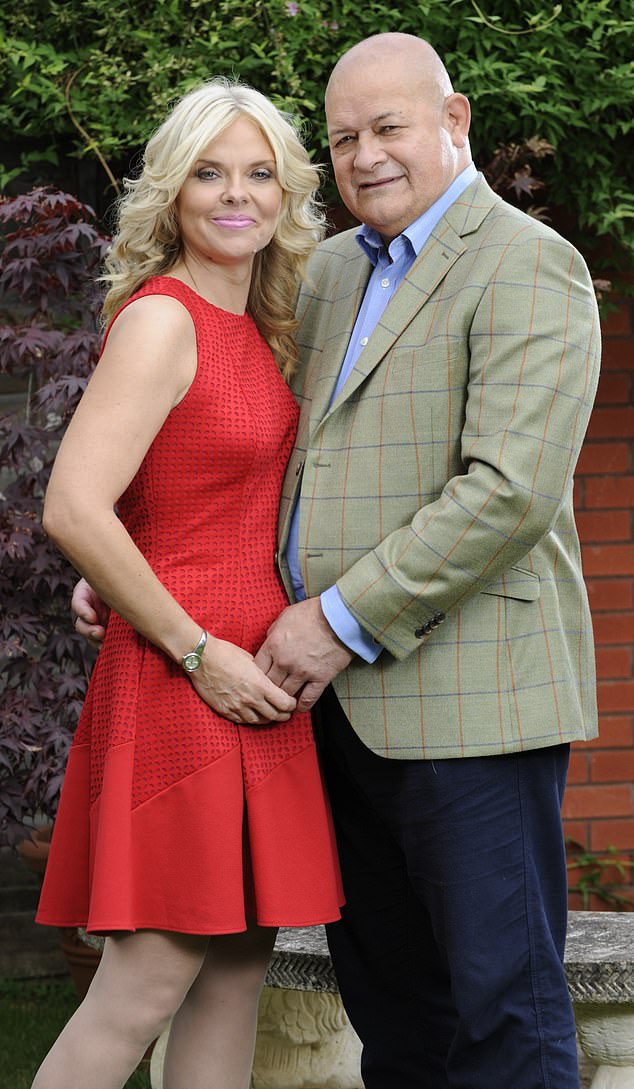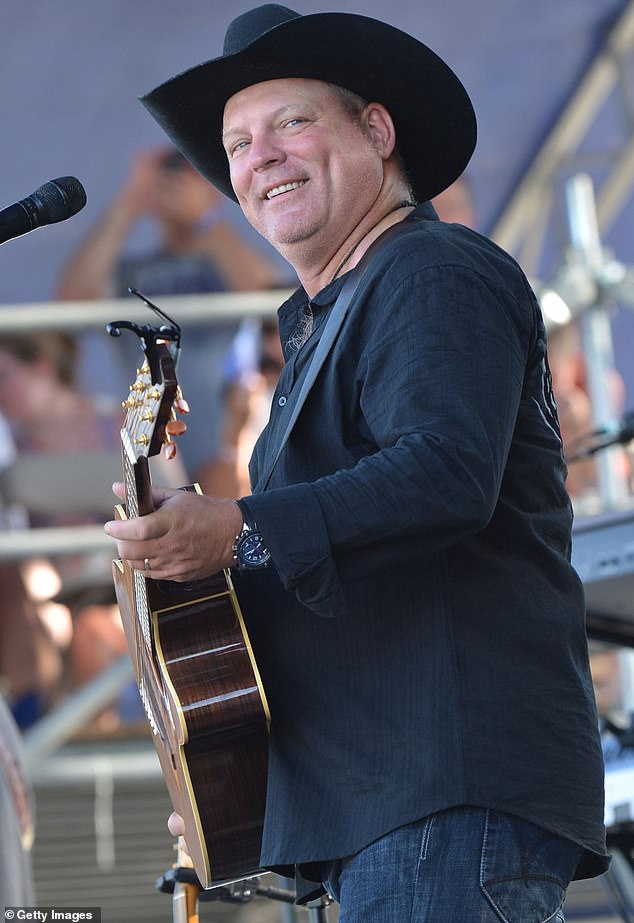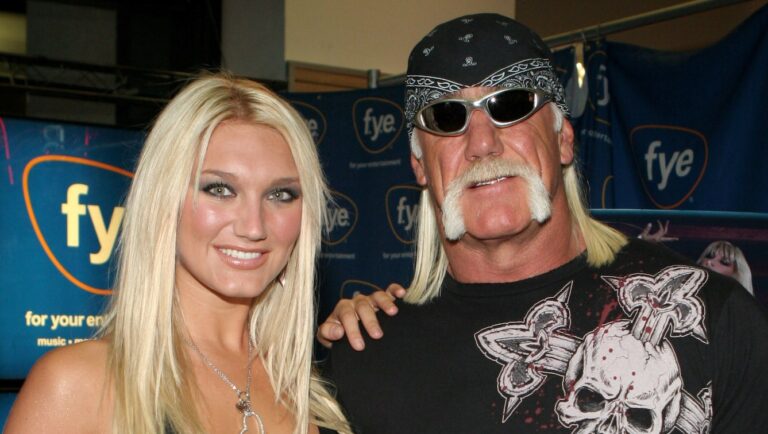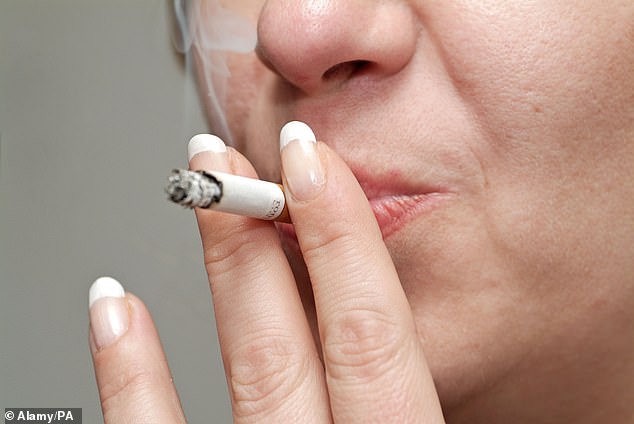It was like a scene from Holby City. The road was blocked off; there were two police cars and an ambulance, and crowds of people I didn’t recognise.
Panic pulsed through me as I spotted my husband Tom’s silver Range Rover smashed into the bushes by the side of the road; the branches bent and broken and the mud tracks showing where he’d veered off the road.
His friend Wayne had rushed to tell me about the accident and driven me there.
But where was Tom?
There were so many paramedics it was hard to spot the stretcher in the middle of the road. I pushed past the barrier and my stomach twisted in agony.
If you have known someone intimately for 23 years, as I had done Tom, you can ‘read’ them. You finish each other’s sentences, know what each other is thinking with just one look.
And the moment I saw his face, eyes closed, skin ashen, I was sure he was dead.
It was as if all I could see was his outer shell and everything inside him that made him human had gone.

If you have known someone intimately for 23 years, as I had done Tom, you can ‘read’ them. You finish each other’s sentences, know what each other is thinking with just one look, writes Rachel Rounds

Rachel and Tom on their wedding day. Tom had suffered a massive heart attack at the wheel, causing a car crash. One of several miracles that day was the fact it occurred just after a roundabout, which had slowed his speed down to about 20mph
Tears streamed down my face as I watched the paramedics frantically attaching cannulas and breathing equipment. It seemed utterly beyond hope but I mustered all my strength and said a silent prayer.
And in that moment something miraculous happened.
I wanted to run to Tom, hold him, beg him not to leave me, but a paramedic held me back. He warned me they were about to insert a respirator: ‘It’s a very distressing thing to watch, I would recommend you turn away.’
But I felt waves of relief; surely this must mean he wasn’t dead. Had he been spared?
It’s at that point that it all became too much and I became hysterical.
I would later learn that was the second time Tom ‘died’ that Monday afternoon in February. Hospital notes show that his heart stopped not once, but twice, on that roadside.
He had suffered a massive heart attack at the wheel, causing the crash. One of several miracles that day was the fact it occurred just after a roundabout, which had slowed his speed down to about 20mph. The car was dented at the front with a smashed headlight and bumper. But, because the old Range Rovers are built like tanks, there was very little damage to the rest of the car. The air bag hadn’t even been activated.
Just as fortuitously, it had happened opposite our local pub, the Dog and Partridge. Having recognised Tom’s car, Lou, who works there, had rushed out with a portable defibrillator for the two off-duty paramedics who happened to be driving behind him.

Unlike me, Tom is not a practising Christian but I have always prayed that he would be. When I discovered he had died twice, I knew God had saved him
After two burly men helped pull Tom out of the car, the paramedics were able to restart his heart, saving him for the first time.
Then after the ambulance arrived he suffered another heart attack; he was given CPR and, once again, his heart was shocked back into life.
At the time I just wanted to lie in a ball on the grass and howl. But I had to stay strong. Not just for my own sake or Tom’s, but for our 12-year-old son, who was being looked after by my best friend. I couldn’t bear the thought of him losing his beloved father like I had done.
I was 13 when my dad died of an epileptic fit. At such a young age, I couldn’t understand why he had to die in such a cruel way. I was struck by the feeling that life was so unfair, so brutal.
As I grew up and my friends started talking about boys and make-up, I was haunted by thoughts that I would never see my father again, and it made me so angry. I never shared it with anyone, but the chatter of my friends seemed so pointless. What was the point of blue mascara when any one of us could be dead the next day?
The thought that now my son could face the same fate was heartbreaking. I was desperate for Tom to pull through.
It took paramedics 40 minutes to stabilise him before they could transfer him to the intensive care unit at the Bristol Royal Infirmary’s Heart Institute — the best in the UK.
I dashed home to collect clothes and a wash kit for him. Our son came rushing out of my friend’s house, across the road, sobbing his little heart out. He wanted to know if his dad was going to die. There was no way his 12-year-old brain could comprehend what had happened – and what still could happen. So I told him that although it was serious, his dad was tough and would be OK.
But at the hospital it was less hopeful. I was ushered into a side room, where the cardiologist came to see me.
‘Mrs Rounds, there is no easy way to say this,’ he said. ‘Because your husband died, he had no oxygen to his brain. The problem is we don’t know how long he was dead before the paramedic performed CPR on him. This means he could wake up tomorrow and be fine, but it also means he may never wake up again.’
This hadn’t even crossed my mind. I tried to speak, but realised I had no words. I felt totally numb.
When I was finally allowed into ICU after midnight, I found Tom covered in wires. His skin was yellow and grey; he looked like a cadaver.
Devastated, my legs started to give way and I felt as though I was going to be sick. I collapsed into a chair and tried to recover myself. Then I got up and put my hand on Tom’s head and prayed.
‘Please, God, not again. Don’t let him die. You took Dad. I was 13, and it screwed up my life in so many ways. Please don’t do this to our son. I can’t bear to have to tell him his dad is dead. I can’t do it. Please God, please.’
As I sat there, holding Tom’s hand, I remembered how my mum had questioned the wisdom of marrying Tom in the first place because he was 23 years older than me. Yes, he was now 76 and I am 53, and I had always known he was likely to die before me. But then my own father had died at just 48. There was no knowing what the future held.
When I arrived at the hospital the next morning, the cardiologist, who had told me he might never wake up, looked a little sheepish as his colleague delivered the incredible news that Tom’s brain seemed to be functioning perfectly well. Much to their shock, given the amount of trauma his brain had been subjected to, he was awake – and even able to talk.
I was elated. When I reached his bedside, he smiled and said, ‘Hello, Mrs Rounds’ – his jokey way of addressing me.
‘Hello, my walking miracle,’ I replied in disbelief, kissing him gently on the forehead.
My very first question was, ‘Did you see the light?’
It was a light-hearted joke to lift the mood, but I was genuinely curious. You hear of people seeing light when they ‘die’ but I also wanted to know if it had changed his perspective on things.
Unlike me, Tom is not a practising Christian but I have always prayed that he would be. When I discovered he had died twice, I knew God had saved him.
The medical report said he had been given Glasgow Coma Scale (GCS) score of three, which indicates the lowest level of consciousness, signifying severe brain injury or death.
I was disappointed when Tom said he couldn’t remember anything of the accident – there had been no glimpse of heavenly light. But I had come so close to losing him.
Still with a lot of drugs in his system, Tom kept repeating the same questions about what had happened and how I had got to the hospital. He wasn’t able to walk until the second day, when he could move slowly to a chair.
Encouraged, I took our son to visit him but it was a mistake. Walking through the ICU, witnessing people dying, really traumatised him. He tried so hard to be brave in front of his weak and frail dad but I didn’t take him back again for several weeks.
Meanwhile, doctors did a battery of tests to try and discover why Tom, who’d had no history of heart disease, had the heart attack in the first place. Some were of the opinion it had to do with electric signals to his heart, while others believed his arteries were to blame. After a month, he was given a triple heart bypass, and he stayed in hospital for another two weeks to recover.
During that time, I visited as often as I could. Friends were brilliant, but it was hard. A catastrophic accident like that doesn’t just affect the patient, of course, but the whole family.
Several weeks in, my anxiety off the charts, I started to suffer terrible nightmares. In the worst one I dreamed I was driving my mum when I lost control of the brakes and gears. In a forest, I had to swerve around trees at top speed.
I woke up just as we were about to hit a tree. It took me a few moments to realise I was in my bed but, even then, it triggered a full-blown panic attack. Unable to breathe, I thought I was having a heart attack.
Thankfully my mum was staying with me. Gasping, I rushed into her bedroom at 3.40am and it took her an hour to calm me down.
Variations of this continued for weeks, coupled with bouts of insomnia.
During the day, I managed to put on a brave front for our son. But I was consumed with worry that something bad would happen to him when he was out playing or at school.
I felt like I was falling apart. I developed vertigo, which was so bad that I couldn’t move my head without being sick. I couldn’t visit Tom for a week as I wasn’t able to leave the house.
In May, after two months, Tom was finally allowed home. An Alpha male, he doesn’t do ‘feelings’, but we are getting better at talking about what happened. He’s happy to see his mates and potter around the house. Neither of us has the energy to go out that often. However, in time, it will improve.
Three weeks ago I was diagnosed with post-traumatic stress disorder. I had always associated PTSD with soldiers and felt like a fraud but there’s no denying I had been through something traumatic.
I have since started Eye Movement Desensitisation and Reprocessing Therapy (EMDR), a psychotherapy technique used to help people recover from trauma, which has helped.
I still feel discombobulated, on edge, tired, emotional, and struggle to sleep. But my focus is on Tom, who isn’t back to his old self either.
On the positive side, we’ve become so much closer as a couple. We laugh about silly things, don’t sweat the small stuff and are more affectionate with each other. This comes from knowing that each day could be our last.
Most importantly, our son still has a father – something I never had.
I watch them through the kitchen window as Tom tries to teach him to mow the lawn, and I can feel a new bond forming between this soon-to-be teenager and his pensioner dad. It’s a deeper bond, because I think they both realise what they could have lost.
As someone who knows what it’s like to grow up missing your daddy, I am so grateful that my son has been granted a reprieve. The fact we have been given another chance of being a family – a bruised and somewhat battered one, but one that’s closer now than ever – is a miracle indeed.









